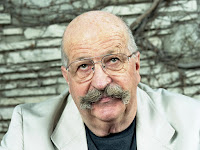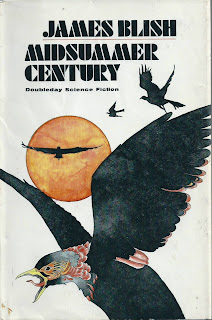The Most Overrated Science Fiction Writers of the Postwar Era
I've been maintaining this blog since late 2008, so I think I have enough credibility to stand forth and declare those nine authors who, in my humble opinion, are the most overrated in the field of science fiction of the postwar era (i.e., 1945-1999).
They are in no particular order; they simply represent those who garnered considerable critical praise, and may even have reached the bestseller lists, but were mediocre writers.
Isaac Asimov
Few authors were as overrated as Asimov, a canny self-promoter who churned out Product and enjoyed fame and fortune while more talented authors struggled to get noticed.My overview of 'The Robots of Dawn' speaks for itself.
Here's Bruce Sterling, writing in his zine Cheap Truth No. 7, about Isaac Asimov's Science Fiction Magazine:
IASFM has always suffered from faanitis; it often cringingly genuflects to Neanderthal fan-letters. It also suffers from Dr. Asimov's own prolixity, for his prolificacy has now reached the terminal stage and he can write any amount of anything about nothing. IASFM still does not take its audience seriously, but at least it has stopped actively insulting it, and things are looking up.
Robert Heinlein
I remember in the mid-1980s sitting down with a copy of 'Stranger in a Strange Land,' one of the most celebrated and critically praised science fiction novels of the postwar era. I gave up on the book about 40 pages in. It sucked. Dull, plodding prose. Dialogue that would have been at home in a pulp work from the 1940s. This was the novel that resonated with the hippies and the Youth Movement of the later 1960s ? The novel that made the word 'grok' a part of the Counterculture lexicon ? Spare me !
Save for the occasional short story, I stayed away from Heinlein's products. 'Starship Troopers' was a middling read, but that was about it. As an action-adventure sci-fi novel, it was inferior to Zelazny's 'Damnation Alley.'
Here's Sterling in Cheap Truth again, this time on Heinlein:
Every year Heinlein cranks out another volume of brain-dead maunderings; every year the sycophants cry "Heinlein is back!"; every year they lie. Even if JOB (Del Rey, $16.95) were a good book, or even a readable book, which I assure you it is not, why would anyone want to give this man a Nebula award? Plenty do, and it's for the same reason they gave Henry Fonda an Oscar for a movie as wretched as ON GOLDEN POND - because he was no longer dangerous.
And here's Steve Brown, from the August, 1980 issue of Heavy Metal magazine, on the much-publicized novel 'The Number of the Beast' from that year:
The Number of the Beast would be total gibberish to anyone unfamiliar with Heinlein's work....The Number of the Beast is useful only for giving a fine cover artist a plum assignment and as material for Heinlein's psychoanalyst.
John Brunner
When, as a teenager in the 1970s, I found myself reading New Wave works, it was impossible to ignore John Brunner, because his paperbacks had all sorts of praiseworthy blurbs on the covers. How could anyone not pick up a Brunner novel, like 'The Shockwave Rider,' 'Stand on Zanzibar,' or 'The Sheep Look Up,' not to mention the large catalogue of his stuff from the 1950s and early 1960s that was packaged by DAW Books ?
Well, I learned that Brunner's more celebrated novels were pretty awful. Meandering, boring plots that were dedicated more to being stylishly avant-garde, than being comprehensible (as per 'Stand on Zanzibar,' and its homage to Dos Passos). Clumsy dialogue that was little better than pulp-era stuff. If you want to bring comfort to your life, stay away from Brunner's 'speculative fiction' works.
James Blish
During his career, Blish greatly was praised by the sci-fi community as one of the most accomplished writers in the field. In the 1995 edition of the 'The Encyclopedia of Science Fiction,' editor Peter Nicholls described him as ‘…an SF writer of unusual depth.’ But the reality was that Blish was only marginally better an author than someone like Asimov or Heinlein. Blish's novels, such as 'Midsummer Century' and 'Spock Must Die,' have interesting premises, but hopelessly dull and uninspired execution. Only the serendipitous assignment of writing the bestselling novelizations for the TV series Star Trek for Bantam Books earned him recognition as a major auteur in the field of science fiction.
Frank Herbert
'Dune' was an example of a novel whose world-building and characterization successfully overcame its lumbering, ponderous narrative, a narrative overlaid with all sorts of obtuse, hippie-era mumbo-jumbo. 'Dune' was anything but an easy read. But it did grant Herbert literary immortality.
Not much can be said about all the other novels and stories he produced. Even when much shorter in length as compared to 'Dune,' books like 'The Green Brain,' 'Hellstrom's Hive,' and 'Dune Messiah' were dull, dull, dull. When Herbert took a chance and ventured into Michael Crichton territory with 'The White Plague,' the outcome was only slightly better than what he had done with his genre novels. The truth is, Crichton could have turned 'Plague' into a much more gripping and impactful novel than what Herbert did with it.
Gene Wolfe

I remember sitting down in the late 1980s with a paperback edition of 'Soldier of the Mist,' expecting great things; after all, the novel had received considerable critical praise. I gave up on the book after about 30 pages or so, and I've religiously stayed away from reading any Wolfe novels ever since. I still read Wolfe's shorter fiction if it's included in an anthology that I'm reviewing, for completeness's sake. But that's about it.
This reviewer lays out all the issues I have with Wolfe's writing:
Having said that, Wolfe can be frustrating. He likes to use unreliable narrators. He makes obscure references, linguistic, historical, and literary, and expects his readers to keep up. He often has key action scenes take place “off stage.”
The problem is, too many people think these defects actually are merits. They are not. They are reasons to avoid any novel written by Gene Wolfe.
Hal Clement
I remember a day in September, 1975, fifty (!) years ago, when I was a sophomore in high school. On a warm day, after school let out I walked to Gordon's cigar store and purchased what seemed like an action packed, intriguing science fiction novel: 'Cycle of Fire,'' by Hal Clement (the pen name of high school science teacher Harry Clement Stubbs).
I only got about 25 or so pages into 'Cycle of Fire' when I gave up in disappointment. It was astonishingly boring. And indeed, every Clement novel that I have read, or tried to read, suffers from the same remarkable dullness. While Clement has been praised for his fidelity to scientific reasoning, the truth is that his books are are devoid of anything in the way of suspense or drama. It's hard to get engrossed in a novel marked by a pedantic approach to writing, combined with wooden dialogue and unremarkable characterizations (particularly of those few females who are present in the narrative).
Theodore Sturgeon
Sturgeon published something like 200 short stories in his career, but almost all of these were issued prior to 1980, after which his output almost entirely consisted of revisions of previously published material. To continue earning money from Sturgeon's writings, publishers cannily churned out one paperback anthology after another, with buyers only learning they were reading decades-old material after looking at the reprinting credits inside the book. Things got so desperate with regard to Sturgeon's curtailed production, that a first draft manuscript, titled 'Godbody,' was trotted out in 1986 by the Science Fiction Book Club (with much fanfare). As feeble as this novel was, it was nominated for a Nebula award by the sci-fi literati, who considered a posthumous product from Sturgeon to be as good as, if not better, than much of the stuff coming from newer authors.
Sturgeon was praised for being sci-fi's most capable and conscientious humanist and this praise led too many to overlook the mediocre caliber of his prose, which struggled to rise above pulp-era quality. His entry 'If All Men Were Brothers, Would You Let One Marry Your Sister ?' in Ellison's 'Dangerous Visions,' is painful reading due to stilted dialogue and a meandering narrative. J. G. Ballard's story, 'The Recognition,' in the same anthology, is light-years superior.
Sturgeon's finest moment probably came with his script for the Star Trek episode 'Amok Time.' And that, sadly, is his standout contribution to sci-fi.
Samuel R. Delany
In a 1975 interview, Ballantine Books sci-fi editor Judy-Lynn Del Rey had this to say about Delany's novel 'Dhalgren' :
I’ve
met very few readers who have finished Dhalgren. And it may be the most
creative, marvelous…. It’s a bleeding bore. It goes on forever.
For my part, I remember at some point in the late 1970s sitting down with 'Dhalgren' (1975) and giving up after the first 45 pages or so. The novel was a 'psychotic fugue,' in the words of cyberpunk founder Bruce Bethke. 'Dhalgren' was a rambling discourse, devoid of plotting, that reflected the author's belief that a novel could, and should, succeed solely on its basis to communicate a sense of existential anomie to its readership. The vapidity of 'Dhalgren' led critics to conclude that Delany was saying Something
Significant within its pages, when in fact he was saying nothing of consequence.
The Delany novelettes and short stories that I subsequently read, such as 'Aye, and Gomorrah....' and 'The Star Pit,' all had received considerable critical acclaim during the New Wave era. These stories were duds; boring, and self-indulgent.
Delany was given a chance to improve his profile heading into the late seventies, with the assignment to write the text to the 1978 illustrated novel 'Empire.' Unfortunately, the book's great artwork, done at considerable effort by Howard Chaykin, was squandered on an incoherent narrative from Delany. 'Empire' revealed that the critical darling had no clothes.
And so, there you have my nine most overrated science fiction authors of the postwar era. Hopefully, these picks will find some agreement among my readers. Or not, as the case may be....














































































